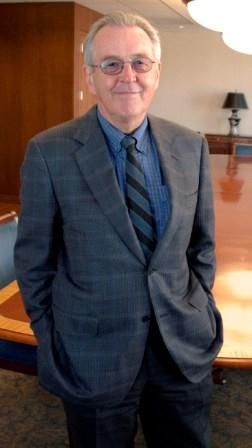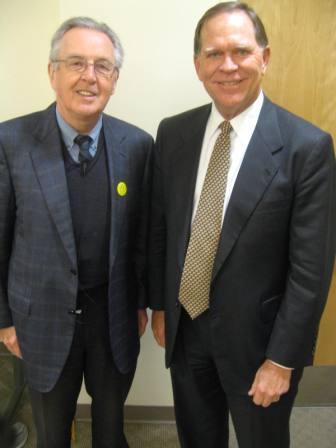April 2010

NOTES FROM THE ACADEMIC SENATE CHAIR
HENRY POWELL
Dear colleagues,
We are in the middle of another challenging budget year. Although there are some encouraging signs—the Governor’s proposed budget restores $370 million to UC—we are far from feeling secure. Although the governor’s idea to formally tie education and prison funding was intriguing, it has not attracted widespread support. Nonetheless, the proposal helped bring attention to the problem and shifted the momentum of the discussion. We now have state leaders acknowledging publicly that UC has been underfunded and that change is needed if California is to remain competitive and have an educated citizenry prepared to meet the state’s long term needs. Many others are realizing that an investment in UC is a long-term investment in California’s future. A new Public Policy Institute of California poll shows a majority of Californians are now willing to pay higher taxes for education.
This is also a “year of advocacy” for the Intersegmental Committee of Academic Senates (ICAS), which is holding all of its 2009-10 meetings in Sacramento. ICAS’ main goals this year are assessing the California Master Plan for Higher Education on the occasion of its 50th anniversary and strengthening advocacy at a time of broad disinvestment in public higher education.
The February 4 ICAS meeting featured a conversation with Assembly member Ira Ruskin, who co-chairs the Joint Committee on the Master Plan for Higher Education. This important discussion reinforced the need for close cooperation among UC, California State University, and the California Community Colleges (CCC). On February 2, I gave testimony at a hearing of the Joint Committee, speaking for the three segments as chair of ICAS. There is a broad recognition that the sharp cuts in funding are undermining the vision of the Master Plan and restricting access to public higher education. The Master Plan’s promise is clearly at risk, with all three higher education segments being forced to turn away many qualified students. We heard how the small reduction in UC enrollment and the much larger CSU cuts have pushed students into the CCC system where course offerings are being restricted drastically.
The three Senate leaders also met with student leaders, and together we spoke with state legislators and their staff. In addition, Vice Chair Dan Simmons and I met with the UC Student Association on February 7 in Merced. We agreed that rising fees and enrollment cuts across the three segments have serious repercussions for access, which is not just about admissions but involves a commitment from the state to fund the enrollment of qualified students.
 |
| Chair Powell with Board of Regents Chair Russell Gould |
Speaking of access, Council recently endorsed a memo from the Board of Admissions and Relations with Schools (BOARS) responding to external groups who are concerned about the potential impact of the new admissions reform policy—Entitled to Review (ETR)—on the ability of their communities and constituencies to obtain a UC education. As BOARS has worked on this policy over the past five years, concerns have been expressed from both sides of the political spectrum, including criticism that ETR would be an end-run around Proposition 209, and more recently, that the policy is unfair to underserved populations. In reality, ETR will cast the eligibility net more widely and allow more students in a larger number of California high schools to have their applications individually reviewed. ETR expands eligibility, but does not change individual campus authority over admissions decisions.
In admissions, as in all things, the periodic reexamination of practices and policies is an important function of effective governance. The UC Commission on the Future and its five working groups are doing just that, and I am hopeful that they will arrive at some helpful proposals.
Two recent California Legislative Analyst Office (LAO) reports—Improving State Oversight of Academic Expansions and Greater Than the Sum of Its Parts—Coordinating Higher Education in California—call for increasing the state’s influence and control over the development and approval of new programs and schools at UC and CSU. I remind you that Daniel Coit Gilman, UC’s first nationally recruited president, resigned in 1875 over the issue of legislative interference, stating “however well we may build up the University, its foundations are unstable, because it is dependent on legislative control and popular clamor.” His resignation helped force the legislature to give UC autonomous status in the 1879 Constitution.
The Academic Council Special Committee on Lab Issues (ACSCOLI) met at Lawrence Livermore National Laboratory (LLNL) in December. I am very pleased about the Senate’s relationship with the leadership of the LLNL. They want to maintain LLNL’s relationship with UC and foster more Senate involvement, and they have been eager to give us an up-to-date vision of the energy and climate-focused research at the labs. Scientists there appreciate that UC is driven primarily by a public interest mission rather than a profit mission.
We must continue working to persuade the public about the value of UC and how UC can serve the state. Robust faculty participation in Senate processes and energetic fulfillment of our shared governance obligations are paramount now and moving forward. The first recommendations from work groups to, the UC Commission on the Future have already come out, and the full Commission will soon choose whether to endorse some or all of these recommendations or make others of its own. In the meanwhile, the President’s Task Force on Post-Employment Benefits will hold a second round of public forums prior to issuing their recommendations. The review timelines will be short, but I urge you to participate as fully as possible at every opportunity. I welcome your suggestions, and I look forward to working with you during the second half of my term as chair.
Fiat Lux,
Harry
